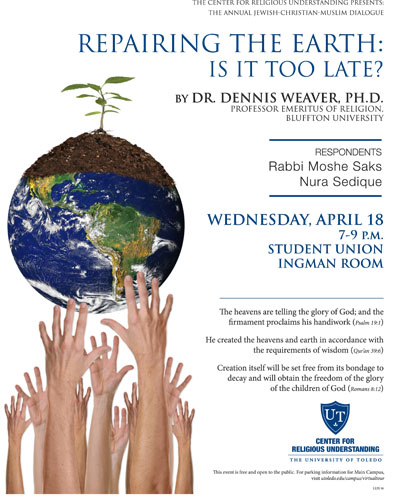 The Annual Jewish-Christian-Muslim Dialogue, sponsored by the UT Center for Religious Understanding, will again unite local members of the three Abrahamic faiths for discussion Wednesday, April 18, at 7 p.m. in the Student Union Ingman Room.
The Annual Jewish-Christian-Muslim Dialogue, sponsored by the UT Center for Religious Understanding, will again unite local members of the three Abrahamic faiths for discussion Wednesday, April 18, at 7 p.m. in the Student Union Ingman Room.
“Repairing the Earth: Is It Too Late?” is the theme this year that will be presented by Dr. Dennis Weaver, professor emeritus of religion at Bluffton University. The respondents will be Rabbi Moshe Saks and Nura Sedique.
“Repairing the Earth: Is It Too Late?” will focus on human effects on the environment and the religious imperatives for the three Abrahamic faiths to remediate those effects.
“Each of the religious traditions share a fundamental understanding of the goodness of creation, but each has a different take on humanity’s relationship to and responsibility for creation,” said Dr. Peter Feldmeier, the UT Endowed Murray/Bacik Chair of Catholic Studies. “It’s an opportunity to share different perspectives on the issue of creation, the degradation of the created world, and the religious imperative to address that.”
After Weaver’s talk, which will discuss a Christian perspective, Saks and Sedique will offer brief responses from the Jewish and Muslim perspectives. Dialogue will then open up at each of the tables at the event and be moderated by discussion facilitators from each perspective.
“The Abrahamic religions can provide a voice of wisdom and transcendental perspective to what is surely one of the most pressing moral issues of the day,” Feldmeier said. “While some politicians frame the issue in economic terms or purely in human terms, theological perspectives can also provide a larger sense of inherent, intrinsic good that must be protected.”
Followers of all three Abrahamic faiths are encouraged to attend, and members of the public are invited to the free, public event.
“The dialogue has proven to be a great opportunity for those of different traditions to get to know one another: Friendships and cordial, warm relationships emerge,” Feldmeier said. “It’s a way for each of the three branches to express their uniqueness as well as their common bond.”